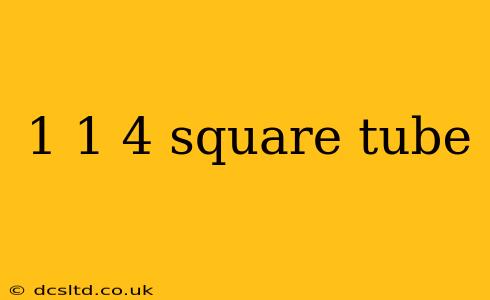Square tubing, specifically 1 1/4 inch square tubing, is a versatile structural component used in a wide array of applications. This comprehensive guide will delve into the specifics of this material, covering its dimensions, common uses, and considerations for material selection. We'll also address some frequently asked questions to ensure you have a complete understanding.
What are the exact dimensions of 1 1/4" square tubing?
The nominal size of 1 1/4" square tubing refers to the outside dimensions. The actual outside dimensions might vary slightly depending on the manufacturer and wall thickness. You'll need to check the specifications from the supplier for precise measurements of the outside dimensions, inside dimensions (which will be smaller), and wall thickness. Always refer to the manufacturer's data sheet for the exact dimensions of the specific tubing you intend to purchase.
What is 1 1/4" square tubing used for?
The applications for 1 1/4" square tubing are incredibly diverse, stemming from its strength-to-weight ratio and ease of fabrication. Some common uses include:
- Structural Support: In furniture making, automotive construction, and various industrial applications, it provides excellent structural integrity. Its square shape offers superior rigidity compared to round tubing.
- Handrails and Guardrails: The robust nature of 1 1/4" square tubing makes it suitable for creating secure and durable handrails and guardrails in both residential and commercial settings.
- Custom Fabrication: It's easily welded, cut, and bent, lending itself to custom fabrication projects such as shelving units, frames, and enclosures.
- Agricultural Equipment: Its durability and resistance to wear make it a good choice for certain components in agricultural machinery and equipment.
- Automotive Modifications: It's a popular choice among enthusiasts for custom automotive modifications, such as roll cages and bumpers.
What materials are typically used for 1 1/4" square tubing?
The most common materials used for 1 1/4" square tubing are:
- Mild Steel: This is the most widely used material due to its affordability, weldability, and sufficient strength for numerous applications.
- Stainless Steel: Offers superior corrosion resistance, making it ideal for outdoor applications or environments with high humidity. However, it's significantly more expensive than mild steel.
- Aluminum: A lightweight alternative to steel, offering good strength-to-weight ratio and corrosion resistance. It's also easier to work with than steel.
The choice of material depends heavily on the specific application and the environmental conditions it will be exposed to. Cost is also a significant factor in material selection.
What is the weight of 1 1/4" square tubing?
The weight of 1 1/4" square tubing is dependent on several factors, most notably the material (steel, aluminum, etc.) and the wall thickness. Thicker walls mean greater weight. Manufacturers' data sheets will provide the weight per linear foot for the specific tubing. You can use this information to calculate the total weight needed for your project.
How strong is 1 1/4" square tubing?
The strength of 1 1/4" square tubing, like its weight, depends on the material and wall thickness. Thicker-walled tubing will naturally be stronger. You should consult engineering specifications and manufacturer data for precise strength information related to bending, torsion, and tensile loads. For critical applications, professional engineering advice is crucial.
Where can I buy 1 1/4" square tubing?
1 1/4" square tubing is readily available from various suppliers, including metal supply stores, online retailers, and industrial distributors. It's recommended to compare prices and specifications from multiple vendors before making a purchase.
This guide provides a foundation for understanding 1 1/4" square tubing. Remember to always consult manufacturer specifications and consider professional engineering advice for projects requiring robust structural integrity.
